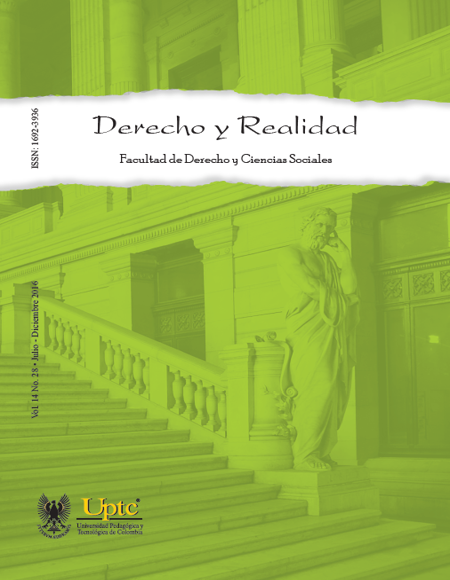“Buen vivír” and constitutional rights within the constitutional and democratic State in Latin America

Abstract
This reflection article aims to reference the theory-practice relevance of Constitucional rights looking for the good life, on the environment of the constitutional and democracy State whith the permanent interacition between Constituient power and constituted power in Latin America. Furthermore accompained by constitucional interpretation like suported of constitutional judge on the guaranty exercise and protection of constitutional rights together neo constitutionalism evolution. It is found that Latin America has changed the Creole constitutional postulate of the 19th and 20th centuries under the line of constitutionalism or neo-constitutionalism, which delegates the protection of constitutional rights to the interpretive normative and discretionary sphere of the judge that in many occasions minimizes or maximizes the rights.
Keywords
Constituient power, constituted power, Constitutional Democracy State, Constitutional rights, Buen vivír, Neoconstituionalism
Author Biography
Carlos Alfonso Cárdenas Hernández
Pedagogical and Technological University of Colombia, Colombia
Juan Pablo Hernández Zorro
Pedagogical and Technological University of Colombia, Colombia
References
- Alexy, R. (2004). Epílogo a la teoría de los derechos fundamentales. (C. B. Pulido, Trad.) Madrid: Colegio de Registradores de la Propiedad, Mercantil y Bienes Muebles de España.
- Colombia. Corte Constitucional. (30 de Mayo de 2017). Sentencia T-361 de 2017. Bogotá. Dworkin, Ronald. (1977). Los Derechos en Serio. Ariel. Barcelona.
- Guastini, R. (1999). Sobre el Concepto de constitución. Cuestiones constitucionales (1), 161-176.
- Herrera, C. M. (1994). La Polémica Schmitt-Kelsen sobre el guardían de la constitucional.
- En: Revista de Estudios Políticos (86), p. 195-227.
- Hoyos Rojas, L. M. (2015). Neoconstitucinalismo ideológico y constitucionalismo multinivel. Bogotá: Temis.
- Martínez Dalmau, R. (2012). Ejercicio de poder Constituyente en el Nuevo constitucionalismo. En: Revista General de Derecho público comparado (11), p. 1- 15.
- Martínez Dalmau, R. (2013). La interpretación de la constitución democrática. En C. Amirante, Constituzione, Economía, Globalizzazione. Napoles: Edizioni Schientifiche Italiane, p. 437-452.
- Martínez Dalmau, R. (2016). Problemas actuales sobre la interpretación constitucional. En:
- Ius. Revista del Instituto de Ciencias Jurídicas de Puebla (37), p. 129-151.
- Mejía, O. Q. (1997). Justicia y democracia consensusal, la teoría neoconstitucionalista en John Rawls. Santafé de Bogotá: Ediciones Uniandes.
- Pisarello, G. (2000). Los Derechos Sociales en el Constitucionalismo moderno. En: M. Carbonell, Derechos Sociales y derechos de las minorías. México: Unam, p. 111- 135.
- Rawls, J. (2012). Teoría de la Justicia. México: Fondo de Cultura Económica. Rubio Llorente, F. (2006). Derechos Fundamentales, derechos humanos y Estado de
- Derecho. En: J. L. Requejo Pagés, Rebelión de las leyes, Demos y Nomos, La
- agonía de la Justicia Constitucional. Asturias: Universidad de Oviedo, p. 203-229.
- Torres Tarazona, L. A. (2016). Derechos Sociales y Constitucionalismo social en Colombia. En: P. E. González Monguí, Los Derechos Fundamentales en la Teoría Juridica. Bogotá: Universidad Libre, p. 229-247.
- Vanhulst, J. (2015). El laberinto de los discurso del Buen vivir: entre Sumak Kawsay y socialismo del siglo XXI.En: Polis. Revista de la Universidad Bolivariana, 14 (40), p. 1-21.
- Viciano Pastor, R., & Martínez Dalmau, R. (2011). El Nuevo Constitucionalismo Latinoamericano: Fundamentos para una construcción doctrinal. En: Revista General de Derecho Público(9), p. 1-24.